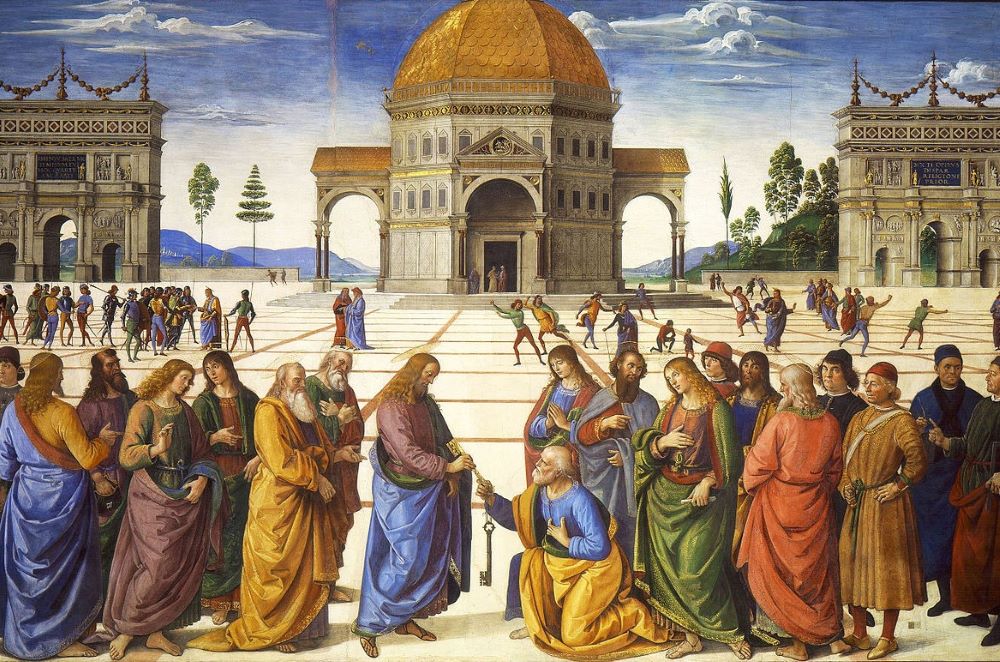
This truly is the battle that rages inside every human soul.
You are the Christ … Get behind me, Satan! (Mk 8: 29, 33).
The gospel of the 24th Sunday in Ordinary Time (Sept. 15) constitutes one of the most dramatic “heel turns” in all of Scripture. Peter, within four measly verses, goes from being the one disciple who perceives Jesus to be who he truly is — the Christ — to being a “Satan” guided only by human thinking.
Matthew’s version of the story (Mt 16:13-23) is even more dramatic, as Jesus explicitly states that Peter’s confession of faith is only possible because of his reception of the Father’s revelation. Matthew includes the part: You are Peter and on this rock… as well.
How does Peter go in one conversation from being the recipient of divine truth, the first confessor of true faith in Jesus as the Messiah, anticipating future events as the first pope, to being a satanic obstacle to the Lord, the epitome of human thinking opposed to God’s ways?
This question should trouble us all. I presume most people reading this article have at least some semblance of Christian faith. We all believe Jesus is the Messiah, the Christ (it’s right there in his name — Jesus Christ!). We all have made some kind of profession of faith at some point in our lives. Maybe that sort of act of faith is even part of our regular prayers, and we certainly do pray the Creed in church each Sunday.
And yet… Get behind me, Satan! If Peter can merit virtually the strongest words of admonition the Lord utters in all the Gospels, we would do well to not be so sure of ourselves in this matter.
What is Peter’s big mistake? He loves Jesus, after all, and he does believe in him. Jesus is telling the disciples, after Peter has declared him to be the Christ, the Savior, exactly how he is going to achieve this work of salvation. And it is a path of unbearable suffering, sacrificial offering, and death.
He does mention that he will rise on the third day, but I think we can presume the disciples did not quite take that in. Resurrection from the dead was almost entirely outside their comprehension (it only makes some sense to us in light of 2000 years of Christianity). Undoubtedly all Peter and the others heard was that Jesus, whom they loved and had come to believe in, was going to suffer, suffer, suffer. And then die.
So, of course, Peter, in his freshly-minted role of leader of the group (no doubt he thought of himself as Jesus’ assistant) pulls him aside to beg him to reconsider this. It’s all quite understandable, sympathetic even. All very human, right?
Well, Jesus has another word for it: Satan!
This may seem extreme to us. Isn’t Peter just expressing his concern? Doesn’t he just want to spare Jesus suffering? Isn’t he just saying that maybe there is some other way to accomplish the task at hand — the salvation of the world — without all this messy crucifixion business? Why is this so wrong?
It’s wrong because it’s not God’s will. And Jesus, just newly professed by Peter and the rest as the Messiah, is telling them what God’s plan is. It is not actually “human,” if we understand what that word really means, to hear God’s plan laid out by the One who knows it and to respond with “well, what about some other plan?”
That is our humanity under the influence of Satan. That is our fallen humanity. Peter wants Jesus to be the Messiah, wants Jesus to be the Savior, and presumably wants to be saved himself. But he wants it his own way, according to his own ideas, on his own terms, according to his own small, limited human way of looking at things.
So there we are. This is a word in season for all of us. We are all at least somewhere on our journey of faith. We all have at least some idea of what it means to be saved, and possess some desire for that happy outcome to our lives. We all want to receive from God the blessed life we are quite sure God wants to give to us.
And that’s all good and right. But we have our own ideas under that heading, don’t we? We have an idea not only about what we want (happiness, joy, blessing) but about how exactly God is to deliver those goods to us, and what those goods will look like when we receive them.
And, of course, the Lord, who suffered and died for us, has made it clear to us that the way he calls us to walk, and the form and shape he will give our lives as we walk that way, will indeed resemble his own way and life, and will involve our own embracing of that cross so as to enter that resurrection.
So what’s it going to be? Will we be truly human, which means to be truly surrendered to the will of God and his glorious but not easy plan for our lives? Or, to put it very starkly, will we be “satanic” in our opposition to that plan?
It is dramatic, yes. But this truly is the battle that rages inside every human soul: God’s ways or our ways, God’s plan or our plan. In the end, it is the only question that matters; in the end, it is the question that determines whether or not our lives will indeed be blessed.
Well, we know Peter’s answer, at least his final answer, and the Church has rested on that rock ever since, however rocky the way to walk it was for him. Faith leading to surrender. May we too be watchful and wise.
Delivery of the Keys to St. Peter by Pietro Perugino, Sistine Chapel, Rome.




